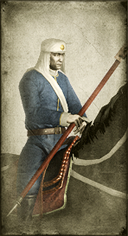
Basic Unit Statistics (can be modified by difficulty level, arts, skills, traits and retainers)
| Recruitment Cost | 1230 | |
| Upkeep Cost | 160 | |
| Melee Attack | 16 | 45% |
| Charge Bonus | 30 | 60% |
| Bonus vs Cavalry | 15 | 50% |
| Melee Defence | 6 | 17% |
| Armour | 2 | 13% |
| Morale | 12 | 24% |
Strengths & Weaknesses
- Good in melee.
- Average melee defence.
- Very good against cavalry.
- Weak against missile attacks and spear-armed units.
- Very good morale.
Abilities
- Wedge Formation - Trained to charge in a wedge formation in order to better penetrate enemy formations
Requires
Description
These swift-moving cavalrymen should be used aggressively to harass enemy flanks, and disrupt other cavalry.
Armed with lances, the guard cavalry are rather good in melee combat. They are extremely useful against other cavalry, where their lances give them an advantage in reach. They are well trained, and have good morale as a result, and can be relied on in most circumstances. A wise general, though, does not commit them rashly against spear- or yari-armed infantry, and tries to keep them safe from rifle fire. All their gallantry will not save these guard lancers from a hail of bullets! Despite the increasing lethality of late nineteenth century weapons, cavalry remained an important force on the battlefield. They were the only force of exploitation, tactical and strategic, available to a general: infantry simply could not march fast enough to take advantage of any gaps in enemy lines. There was, however, a good deal of debate about how cavalry should be armed, with many favouring carbines; this was something that many cavalrymen, heirs to all the "dash and fire" of previous generations, thought reduced them to the status of mounted infantry. In armies that followed the French fashion there was a definite tendency to favour the charge, and this resulted in lancers and sabre-armed cavalry surviving for longer than was probably justified. A lancer had to get within a spear's length of a target before he could do any harm. A carbine-armed chasseur could kill a man at a distance. For all his courage, technology was not on the side of the lancer.
